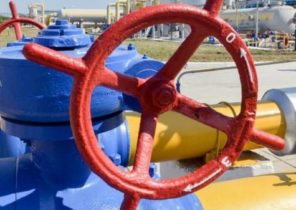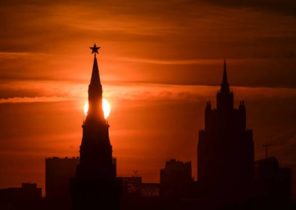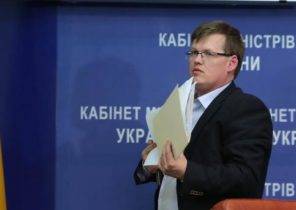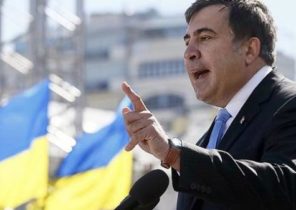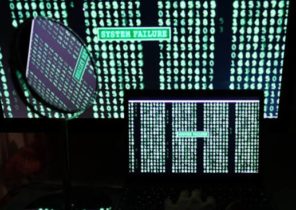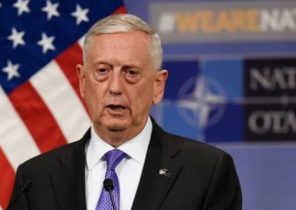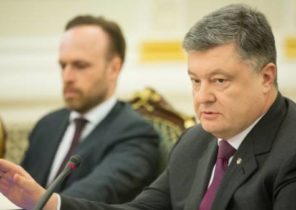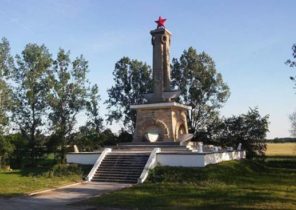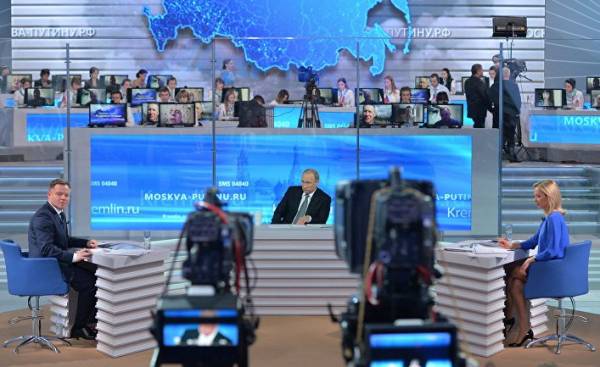
On 15 June the President of Russia Vladimir Putin held a direct line, which, despite repeated from year to year the format was to some extent special: analysis of the communication of the President with different audiences suggests that the political regime has reached the highest degree of maturity and rested in a kind of ceiling for their political development. There is a critical vnutrirezhimnye depoliticization of the public sphere and tight sealing in the system of government decision-making.
On the eve of this straight line it was easy enough to formulate the agenda of the most poignant, controversial or relevant issues that are outlined primarily in the public information space. In foreign policy, for example, the development of Russia’s relations with America trump’s plans, if any, on the normalization of the dialogue with Europe, cooperation with NATO, brickset and the growth of antiglobalization sentiment in the world, Ukraine and Syria — what are still there is Russia and what are its strategy and tactics. In financial and economic policy is a complex budgetary problems, the issue of exhaustion of sovereign wealth funds, structural reforms, pension reform, the fate of the banking sector, privatization — including “Rosneft” and its fate. In the political sphere — loud criminal cases of the new wave of protest, including in Moscow, the role of systemic and non-systemic opposition, the politicization of the state Duma, policy NGOs, strengthening the role of the security services, the effectiveness of Regardie.
However, almost none of this, with rare exceptions, and reservations, has not found its meaningful reflection in the answers of Putin. And even if some aspects were touched upon, in passing and superficially: Vladimir Putin clearly has not been configured on the conversation about the essence of things. Current video line in this context is an absolute exception: from the public perspective of the President almost one hundred percent was removed the whole policy.
Caretaker and political leader
To understand what happens back to last year, the President communicated with the people: then was the impression that Vladimir Putin is restoring the basic functions of a political leader. After he has virtually disappeared from domestic policy in 2015, last year he tried to appear before the population in a variety of capacities: as a man with his family interests and values, as an effective Manager, a cautious reformer and, more importantly, is the national leader in intra and arbitrator. It was not just the Manager, it was a politician offering solutions.
This year, despite the significant politicization of life in the country, there is a critical narrowing of the functional leadership of Putin. The first thing that catches the eye is a radical marginalization of the perspective of the straight line. Public policy issues are reduced to issues of private, local, and usually having only a local specificity. So, one of the first stories about the low wages of young teachers — Putin has attributed to the competence of the management of the school, which has been affected by this problem. Each of these themes are somehow reduced to the private and even exclusive manifestation, failure in public policy, the essence of which Putin did not want to comment. No specialists? We have to see what I can do. There is no common educational space? It is necessary to consult with experts. Raising the retirement age? The decision is not accepted. The President, whose function is to develop the state policy, almost completely abandoned the software view of the problem.
Issues requiring structural-strategic statist approach (state of health, pension systems, education sector) have been “worked out” at the level of parochial private plots. Where there were cases of gross human rights violations, Putin has preferred to operate the old-fashioned method of manual control with the only difference that now it has to do with a jeweler’s precision, sinking to the lowest managerial levels. So, when the question arises about the demolition and the construction of housing — an issue of national importance that the President pays attention to this not in the context of the President’s policy and the consequences of its implementation, and through the perspective of solving a specific, single case. It completely dissolves Putin’s role as state Manager.
However, almost dissolves completely and the political function of national leader Putin during this communication turned into “national steward”: we have seen a narrowing of the field of public policy to issues of technical management, and in the vast majority of affected plots were completely excluded long-term component. Putin even did not use the area straight line to raise awareness on socially relevant topics. The state administration was substituted for the monitoring of the situation in the country and correction of failures through personal intervention. The generation rate of the substituted control (which will inevitably lead to the widening of the functions and prerogatives of the repressive apparatus). In such circumstances, there can be no electoral program for the presidential election: its role will be to perform a “antiprograms” — playing on the fear of change.
Of a straight line is also almost completely disappeared the theme of the future, although it was leading and started the event: it would seem that this was to be the Central plot, especially considering the fact that the subject “vision of the future” is being worked and close to the presidential Administration expert Center for social research. Future “got out” just in closing remarks, Putin, when the President briefly outlined the goals for the future: income growth, getting rid of dilapidated housing, increasing growth, improving labor productivity, the transition to the next technological mode. But that remains to be done, not a word.
Social burden President
Straight lines has been repeatedly criticized for routinization and trivialization. But this is not the cause but the consequence of the transformation of Putin’s regime becoming Swersey. A feature of this stage is the absorption power of the whole sphere of the political (all legitimate policy). It makes relations of power and society “technical”, publicity in the functioning of the state becomes redundant and marginalities. Putin has nothing to say to the people, not because there are no solutions, but because the nation is deprived of its subjectivity. With silent wall does it make sense Frank?
In practice, this means sealing the political and administrative sphere and the absolute separation of Putin’s real agenda from the agenda left by the government to dialogue with society. The discourse of the straight line was confined to within an imaginary power of socially important issues: pensions, wages, the fate of individual enterprises, the private matters which are considered exclusively from the point of view of the inevitable “social burden” of the President. But the real issues are dealt with by him exclusively behind closed doors.
This leads to the fact that straight lines cease to be transmitters of attitudes, emotions and positions of the President, for whom this dialogue mechanism is a vestige from the era of the political maturation of his regime. If during the communication with the people, the President avoided the subject, for example, the Bulk, this does not mean that the question is irrelevant for the Kremlin: it only means that society is forcibly deprived of the right to participate in the discussion of this topic.
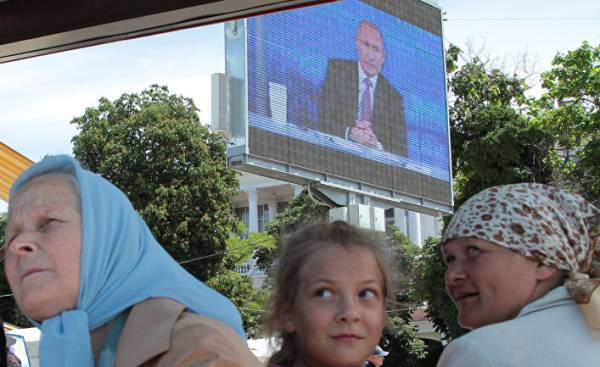 © REUTERS, Pavel RebrovТрансляция “Direct line with Vladimir Putin in Sevastopol
© REUTERS, Pavel RebrovТрансляция “Direct line with Vladimir Putin in Sevastopol
A demonstration against this background that the current direct line was held with a large time delay: usually the event takes place in April. Observers tied the delay in problem-2018: that a decision on a presidential campaign was not adopted, and hence the event was held until clear. However, this assessment is the importance of Putin’s public sphere: the delay is not due to the uncertainty and abstractness of the President on much more important topics — Syria, terrorist attacks, the intensification of contacts with the United States, visit France, and so on. Direct line came when only residually Putin has freed up her time: this “social obremenitve” requires serious preparation, and hence forces. Changing Putin’s motivation: the straight line looks like a political charity, not a dialogue with those who by the Constitution is presented the source of his power.
Politics as the destabilization of
The oddity of the current straight line is connected with the transformation and attitude of Putin, accustomed and well able publicly and convincingly to defend their political position, albeit causing criticism. The willingness to be honest and open dialogue was part of the image of the President, and his answers, albeit often aggressive, emotional, but very transparent from the point of view of his logic, emphasized a desire to speak frankly with the most difficult audiences.
In the last year, Putin began to gradually lose this quality, probably accumulating fatigue from the growing misunderstanding, and everywhere: in dialogue with world leaders, and dialogue with domestic audiences. Constant, repeated from year to year the chewing of Russia’s position on issues such as relations with the West, Ukraine, Syria, the non-systemic opposition, which Putin has always seen agents of destabilization, acting in the interests of external players, ABM, NATO, energy, etc. — meets the growing wall, not only of misunderstanding but also of resistance. That is why the problem of relations with the outside world globaliseerumise, and the geopolitical crisis of 2014-2015 of a temporary problem, more and more transformirovalsya in the age-old policy of containment of rising from its knees Russia. Is the fundamental review indicate that the hostility of the West in the eyes of Putin ceases to be a subject of bargaining and may not be part of the “great deals”.
As a consequence, in the framework of the straight line we observe is a new portion of the chewing and trying to convince the world of righteousness, to find understanding, banal absurdities foreign policy rhetoric, when one of the main anti-Russian players in the United States, retired FBI Director Putin offers asylum by comparing it to Snowden, and Petro Poroshenko ambiguous ridicule on the subject of rapprochement with Europe and the dominance there of the “blue uniforms”. Issues of strategic importance, such as, for example, the presence of Russia in the Arctic, only superficially marked, making the discussion of the nuances exclusively a subject for discussion at the closed meeting in a narrow composition.
Finally, a straight line allows to reveal one more feature of the current situation: the final stage of the political monopoly of the regime. Everything connected with the fighting clans, domestic competition, distribution of balances, influence, etc., in the eyes of Putin — technical settings, not politics. This policy is transferred inside the country in the external sphere, where everything, from A to z, is viewed through the prism of the corrosive environment. This environment, where previously the main actor was seen as conditional to the state Department, now it turns out a multicenter, uncontrolled, but always aimed at the weakening of Russia and the shift of power in it.
That is why such issues as protests, conflict associated with St. Isaac’s Cathedral, or the discussion around the movie “Matilda” received the most General answers to the President not think that this is the problem of the relationship of government and society. “We need to depoliticize this issue, forget that she exists,” Mr Putin said, supporting the transfer of Saint Isaac’s Cathedral Russian Orthodox Church. By itself, the wording in this form — a vivid indicator of the attitude of the President to all political as destabilizing, destructive. Even in matters of dialogue with the opposition, he considers valid the preservation of it is not political and expert functions. “We need to offer solutions,” he said, accusing his critics of trying to “cash in on the difficulties.” Such an approach, and it is important to emphasize, generally, in principle, preclude the existence of opposition as a legitimate institution, competing for power.
Big politics was affected only after the straight line, when Putin began to answer the questions of the journalists. And then the President spoke not with the people, artificially derived from the sphere of political, and appealed to, for example, their real “enemies”, accusing bi-Bi-si in the support of Navalny and propaganda. But such themes as the fate of RBC or searches Serebrennikov, did not cause any keen interest: for the President it subjects marginal.
The straight line shows that Vladimir Putin identifies legitimacy with the legitimacy of the state. In this case, all that is aimed at weakening automatically becomes a threat to Russia. Critics of the regime say that this is not news: “no Putin, No Russia” was made a few years ago. However, the first time the power of the Institute will be transformed in something completely airtight in relation to the society, and the role and support becomes an automatic attribute. “No need to excite people,” said Putin, speaking about the protests against the transfer of Tsar Peter of the Russian Orthodox Church. But it also may refer any other matter, whether it be pensions, salaries, war in Syria, or anything else. By itself, the protest delegitimiziruet as a political action.
In 2015, Vladimir Putin fell out of domestic politics, in 2016, tried to return and restore the leadership function. But in 2017, it became apparent that instead, foreign policy banal absorbed internal. Domestic competition automatically gets geo-political context and becomes a matter of relations of power and opposition, the authorities and external enemies. Domestic policy is replaced by the agent search and building barriers to entry. And this is not the sphere of public policy, and the specifics of the intelligence and competence of the President’s inner circle. And in this context the age-old resistance to the policies of deterrence have no place for reform or for social or economic policy. Not in this place and for the image of the future, where the well-being of Russians is not dependent on the effectiveness of government policy, and how successfully overcome the influence of external aggressors.
Whether Putin will run for President in the 2018? The question seems rhetorical: the details of the operation’s re-election, the population definitely will be informed closer to the day of the vote, minimizing the risks of force majeure, and threats from hostile agents of influence. Well, voting for or against Russia leaves no doubt as to what will be people’s choice.
